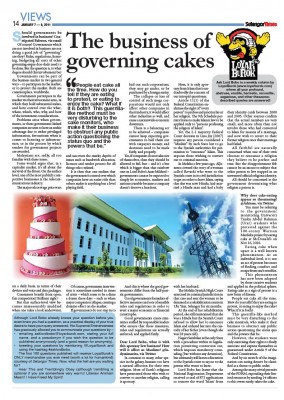 From the Selangor Times Issue 7, 7-9 January 2011. Ask Lord Bobo is a weekly column by LoyarBurok where all your profound, abstruse, erudite, hermetic, recondite, sagacious, and other thesaurus-described queries are answered! You can view the entire paper at the end of this post, and download a pdf of the entire paper here.
From the Selangor Times Issue 7, 7-9 January 2011. Ask Lord Bobo is a weekly column by LoyarBurok where all your profound, abstruse, erudite, hermetic, recondite, sagacious, and other thesaurus-described queries are answered! You can view the entire paper at the end of this post, and download a pdf of the entire paper here.
This week, Ask Lord Bobo answers questions on government-involvement in business, apostasy, and why our polis don’t like cake!
Should governments be involved in business? Constipated Baboon, via email
Of course! Governments which are not involved in business are not doing a good job of “governing” are they? Rules, regulations, licensing, budgeting all sorts of other governing-esque doo-dads need to be done. But the question is, to what degree should this involvement be? Governments can be part of the business market in two general ways — to participate in the market, or to protect the market. Both are commonplace, worldwide.
Governments participate in the market via their investment arms, in which they hold substantial stakes, and have control over the what, where, which, who, why, and how of the investment considerations. Problems arise when governments, or these government-linked companies are seen to have an unfair advantage due to either privileged information, favouritism when it comes to licensing or infrastructure, or in the process by which tenders for government projects are awarded. Malaysians are, sadly, all too familiar with these issues.
Some would argue that, in a capitalist market, it’s all about the survival of the fittest. On the surface level, one of the most publicly competitive businesses is the telecommunications industry. The major telcos wage price wars on a daily basis, in terms of their devices and voice and data packages. Consumers benefit from open, fair competition! Brilliant right?
But that surface-level view becomes immeasurably muddied when one takes a look underwater, and uncovers the murky depths of issues such as bandwith allocation, licences and tender process for all things telco-related. It is then that one realises that the government’s control over which companies have an easier ride than others makes it anything but a level playing field.
Of course, government intervention is sometimes needed in times of crisis — which seem to be a dime a dozen these days — such as when major companies collapse, creating a domino effect on the market. If governments do not step in to bail out such corporations, they may go under, or be purchased by a foreign entity. The collapse or loss of control of such mega corporations would not only affect other companies in their industry, it would affect other industries as well, and cause a nationwide economic downturn.
There is a balancing act to be achieved — companies cannot keep expecting governments to bail them out with taxpayers money, and decisions need to be made fairly, and properly. Yes, if companies do not take care of themselves, then they should be allowed to fail, but — and it’s a but which is bigger than that rainbow one on Lord Bobo’s Aunt Mildred — governments cannot be expected to simply let economies, markets and nations crumble because a company doesn’t deserve a handout. And this is where the good governments differ from the half-past-six governments (before proceeding, it must be pointed out that Lord Bobo does not agree that the term “half-past-six” be used to describe mediocrity — His Supreme Eminenceness happens to be quite fond of half-past-six, as that is when the best soap operas, Doraemon, and Captain Planet, and the X-Men are on the telly, plus it is when his favourite purple pisang goreng stall fries up its best batches).
Good governments formulate effective measures and sets of sensible rules and regulations in order to avert a major economic or financial catastrophe. Good governments create ministries staffed by responsible leaders who ensure that these measures, rules and regulations are actually enforced, and applied fairly. Good governments also… eh, hang on, you’re from Malaysia… so all that good government stuff was irrelevant. Nevermind then!

Dear Lord Bobo, what is with this apostasy law business? How will it affect us Muslims? @ladymissazira, via Twitter
In common to many other species in the galaxy, humans too have a natural affection for their own religion. Most of Earth’s religions have persecuted those who wish to convert to another religion, calling it apostasy. In Malaysia, it is only apostasy from Islam that is undoubtedly the concern of our intrepid questioner.
Article 11(1) of the Federal Constitution enshrines the right of “every person” to profess and practice his or her religion. The 9th Schedule permits States to make Islamic law to be applied only to “persons professing the religion of Islam”.
Yet, the 2-1 majority Federal Court decision in Lina Joy (2007) requires any person considered a “Muslim” by such State law to go to the Syariah authorities for permission to “renounce” Islam. This exposes those wishing to convert out to criminal sanction.
In Melaka a few years ago, AlJazeera covered the story of a woman called Revathi who went to the Syariah court in its civil jurisdiction to get an order to leave Islam, saying that she was now Hindu, had married a Hindu man and had a baby with her husband. The Melaka Syariah High Court exercised its criminal jurisdiction in that case and sent the woman to be detained at a rehabilitation centre in Ulu Yam, Selangor for 6 months. At the end of the 6 months, she still maintained that she was a Hindu but the Syariah Court refused to allow her to renounce Islam and ordered her into the custody of her father (even though she was 28 years old).
Negeri Sembilan is the only State with a procedure within its legislation permitting conversion out, which imposes mandatory counseling (but without any detention), but ultimately still leaves a discretion to the Syariah court to say no to the person who wants to leave.
Should Muslims be concerned by apostasy? Lord Bobo has learnt that the National Registration Department in fact only received a total of 873 applications to remove the word “Islam” from their identity cards between 2000 and 2005. Other sources confirm that the actual numbers are very small, and more often than not involve those who had converted to Islam for reasons of a marriage, and now wish to revert to their former religion once their Muslim marriage had failed.
All faithful are naturally concerned when one of their own chooses to renounce a religion they believe to be perfect and true. But the disappointment felt cannot be an excuse to subject that other person to live trapped in a false official religious identity. All should be concerned at the government determining what religion a person is.
Why does cake-eating appear so threatening to PDRM? @Adriene, via Twitter
You must be referring to the PDRM monitoring Universiti Tunku Abdul Rahman (Utar) students who protested against the 100-storey Warisan Merdeka project by eating cake at McDonald’s on 16 November 2010.
Eating cake when upset is a well known phenomenon. At an individual level, it is not an act of protest but more of finding comfort and escape from one’s troubles. This phenomenon has now been adapted by those creative students and applied in the political sphere. Eating cake as a sign of protest is a new form of dissent.
People eat cake all the time. How do you tell if they are eating to protest, or eating to enjoy the cake? What if it is both? This guerrilla-like method must be very disturbing to the PDRM, who make it their business to obstruct any public action questioning the status quo and the powers that be. However, the students were only exercising their rights to freely associate and express themselves as guaranteed under Article 9 of the Federal Constitution. And by no stretch of the imagination can eating dessert be classified as a threat to public order.
Among the many trivial pursuits of the PDRM, expending their limited resources by sending 14 officers to this event surely takes the cake.
Although Lord Bobo already knows your question before you even knew you had a question, as a practical display of your true desire to have your query answered, His Supreme Eminenceness has graciously allowed you to communicate your questions by —
- emailing [email protected], stating your full name, and a pseudonym if you wish the question to be published anonymously (and a good reason for anonymity).
- tweeting your questions by mentioning @LoyarBurok and using the hashtag #asklordbobo.
The first 100 questions published will receive LoyarBurok’s ONLY merchandise you ever need (worth a lot for humankind) courtesy of Selangor Times. Now, what the hell are you waiting for? Hear This and Tremblingly Obey (although trembling is optional if you are somewhere very warm)! Liberavi Animam Meam! I Have Freed My Spirit!


The embed thing at the end is quite cool!